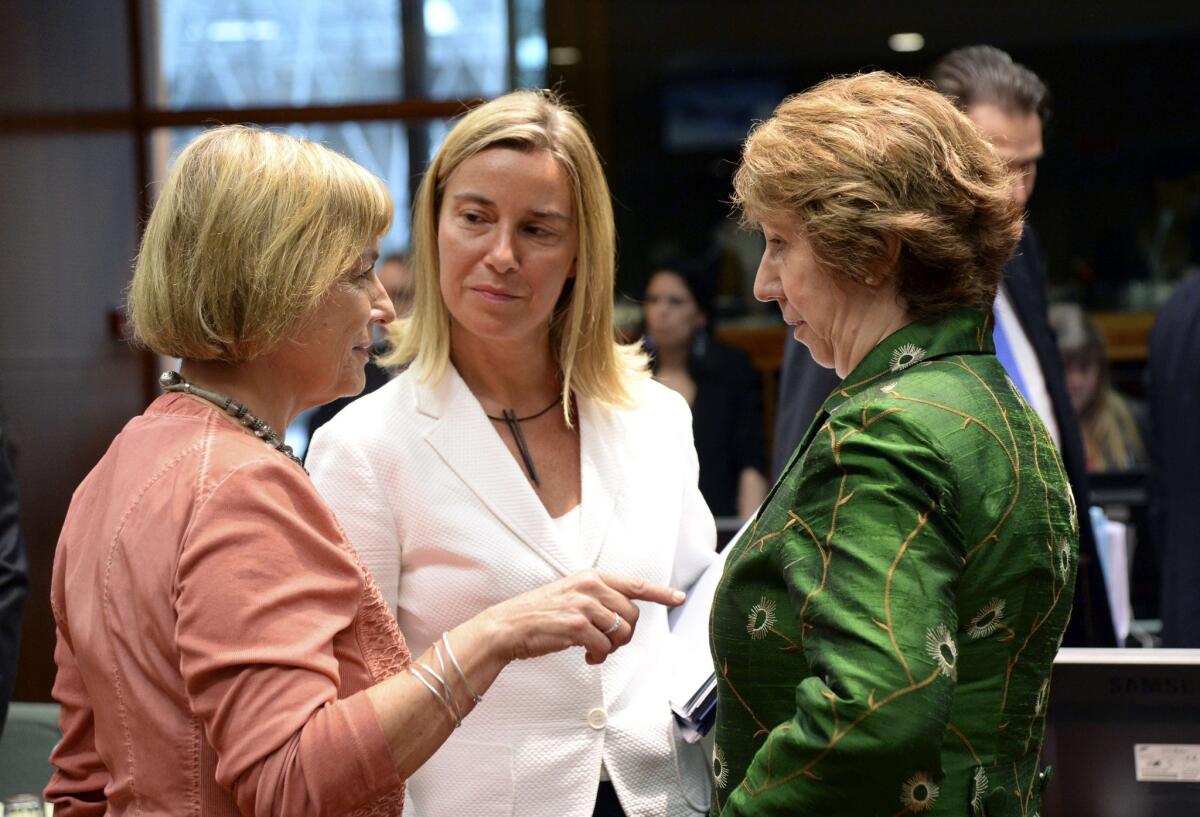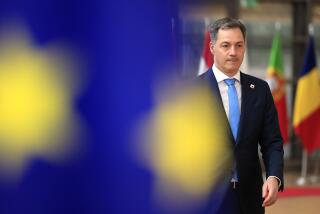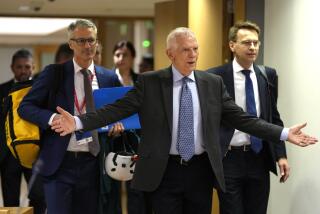EU expands sanctions on Russian officials, weighs broader penalties

Europe’s top diplomats agreed Tuesday to impose sanctions on more Russian officials and entities that have allegedly contributed to the unrest in Crimea and eastern Ukraine, including the downing of Malaysia Airlines Flight 17 by a suspected Russian missile.
Dozens of names are already on the blacklist.
Foreign ministers from the European Union’s 28 member states, meeting in Brussels, stopped short of sanctions against whole sectors of the Russian economy but ordered EU bureaucrats to come up with such targeted measures by Thursday. The measures could then be activated if Russia persists in destabilizing Ukraine.
Those measures would curtail trade in arms, energy technology and goods with both military and civilian applications, and restrict Russian access to capital markets.
“The cronies of Mr. Putin and his clique in the Kremlin are the people who have to bear the pressure, because it is only them feeling the pressure that will in turn put pressure on the Russian government,” British Foreign Secretary Philip Hammond said, referring to Russian President Vladimir Putin. “If the financial interests of the group around the leadership are affected, the leadership will know about it.”
Among those pressing for tougher action against Moscow are former Soviet bloc countries, including Baltic nations nervous about the ambitions of the giant neighbor that once held them in its orbit.
Linas Linkevicius, the Lithuanian foreign minister, said before meeting his EU counterparts that Europe’s penchant for moving slowly and cautiously had exacerbated the situation.
“Sometimes by our inaction, by our ‘wait’ position, we are becoming part of the problem,” Linkevicius said. He described the downing of the Malaysia Airlines plane as a wake-up call for those in Europe who still held more benign views of Putin’s Russia. “It must be [a] turning point in our mindset,” he said. “I don’t know what else should happen in order to understand with whom we are dealing.”
Ultimate consensus on increased sanctions against Moscow could prove elusive, given many European countries’ trading ties with Russia and the region’s fragile economy.
Britain is leading the charge for stiffer penalties, saying that Moscow needs to suffer consequences for fomenting the unrest in eastern Ukraine that resulted in pro-Russian separatists allegedly shooting down the airliner, killing all 298 people aboard.
“This terrible incident happened in the first place because of Russia’s support to the separatists in eastern Ukraine, because of the flow of heavy weapons from Russia into eastern Ukraine,” Hammond said before Tuesday’s meeting.
“I shall be urging my colleagues and our partners to send a very clear and strong signal to Russia today,” Hammond said, adding: “Everybody wants to see a balanced set of measures as we go forward, but the world has changed” in the last few days.
Other European nations such as Italy and Germany have been reluctant to crack down too harshly on Moscow for fear of damaging their economies or jeopardizing their imports of Russian gas.
Signs of greater cooperation by pro-Russia separatists with the international investigation into the jetliner crash and with the repatriation of victims’ bodies could also sap European will to impose tougher sanctions against Russia.
So far, the EU has issued the financial freezes and travel restrictions against dozens of Russian and Crimean political and military officials, but has stopped short of the broader measures that the United States has taken against Russian financial institutions and companies. Washington has urged the EU to show more resolve in sanctioning Russia.
European officials who champion tougher measures say an embargo on sales of military goods to Russia would be a sensible step. But others balk at the idea, including France, which does not want to cancel its $1.6-billion contract to supply two advanced warships to Russia.
“We should’ve had an arms embargo quite some time ago,” said Carl Bildt, the Swedish foreign minister. “To deliver arms to Russia in this situation is somewhat difficult to defend, to put it mildly.”
The final decision could hinge on the wishes of the Netherlands, which lost more of its citizens -- nearly 200 -- on the Amsterdam-to-Kuala Lumpur flight than any other nation. The Dutch government has not indicated exactly what it wants to see done regarding Russia, except to say that “all political, economic and financial options are on the table.”
Follow the Times’ @HenryHChu on Twitter for news from Europe
More to Read
Start your day right
Sign up for Essential California for news, features and recommendations from the L.A. Times and beyond in your inbox six days a week.
You may occasionally receive promotional content from the Los Angeles Times.







